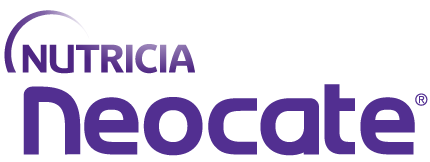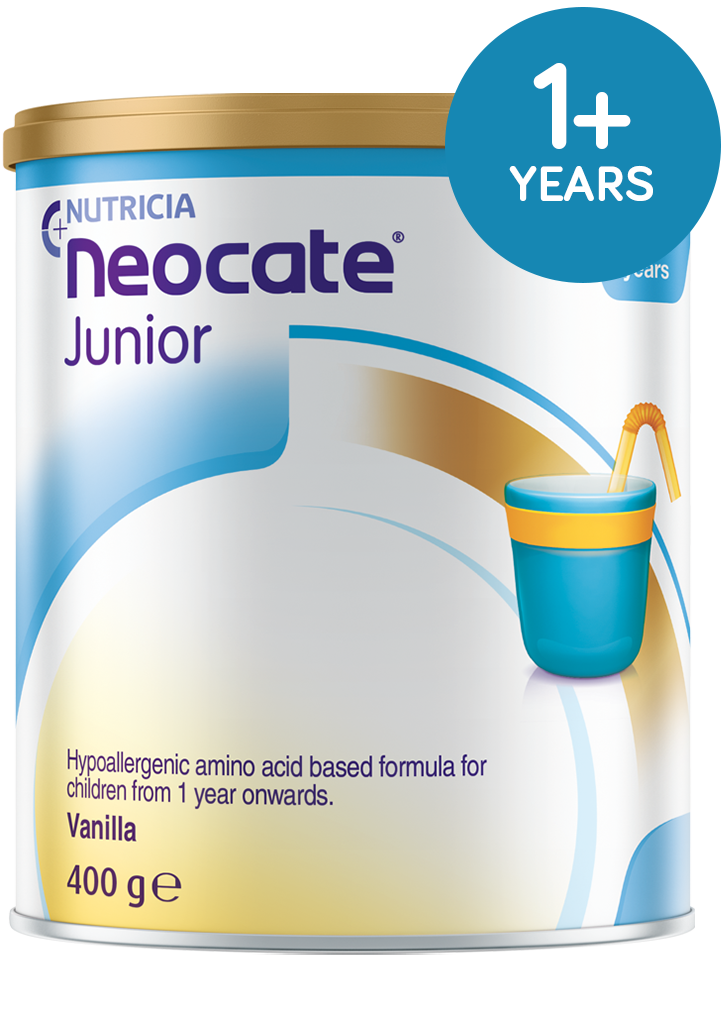Product Information
An amino acid-based formula with prebiotic fibre specifically designed for children over one year of age. Neocate Junior is nutritionally complete and may be used as a sole source of nutrition in children over one year of age or as a supplement to the diet.*
Features
- Hypoallergenic
- Nutritionally complete
- Contains the prebiotics, short and long-chain fructo-oligosaccharide
- Contains 35% medium-chain triglycerides (MCT)
- Milk and soy protein-free
- Vanilla flavoured
- Neocate Junior also comes in an unflavoured powder
Contraindications for use
Neocate Junior is not suitable for children under one year of age. Must be used under medical supervision.
Direction of use
Always follow preparation instructions as stated on the Neocate Junior can. One level scoop provides 7.3g powder.
- Wash hands thoroughly, clean preparation area
- Measure the correct amount of cooled boiled water into a container
- Add the prescribed number of level scoops of Neocate Junior to the pre-measured water
- Cover and shake until the powder has dissolved
- Once prepared, refrigerate and consume within 24 hours
- Shake or stir immediately before use
Storage
Store unopened tins in a cool, dry place
Once opened, reseal can and store in a cool, dry place (not a refrigerator) and use within 4 weeks
Feeding Guide
Your doctor or dietitian will advise the appropriate amount of Neocate Junior to be given. This may vary depending on how much and what types of solids are permitted, as well as the age and weight of your child. Feeding table below should be used as a guide only:
| Scoops | Water (ml) | Approximate total volume (ml) |
|---|---|---|
| 4 (29.2g) | 120 | 140 |
Nutritional Information
| Average contents | Per 100g | Per 100ml* |
|---|---|---|
| NUTRITION INFORMATION | ||
| Energy | 1976 kJ | 419 kJ |
| 472 kcal | 100 kcal | |
| Protein Equivalent | 14.8 g | 3.1 g |
| 12 %E | ||
| Carbohydrate | 51.4 g | 10.9 g |
| 44 %E | ||
| Sugars | 4.4 g | 0.93 g |
| as Lactose | 0 g | 0 g |
| Total Fat | 23 g | 4.9 g |
| 44 %E | ||
| of which MCT | 6.9 g | 1.5 g |
| Monounsaturates | 8.0 g | 1.7 g |
| Polyunsaturates | 4.1 g | 0.87 g |
| of which LA | 3750 mg | 794 mg |
| of which ALA | 372 mg | 78.9 mg |
| ω6:ω3 ratio | 10:1 | |
| Fibre | 1.9 g | 0.4 g |
| MINERALS | ||
| Sodium | 239 mg | 50.6 mg |
| 10.4 mmol | 2.2 mmol | |
| Potassium | 653 mg | 138 mg |
| 16.7 mmol | 3.5 mmol | |
| Calcium | 565 mg | 120 mg |
| Phosphorus | 382 mg | 80.9 mg |
| Magnesium | 76.5 mg | 16.2 mg |
| Chloride | 364 mg | 77.1 mg |
| Ca:P ratio | 1.5 | |
| VITAMINS | ||
| Vitamin A | 287 μg-RE | 60.8 μg-RE |
| Vitamin D | 9.5 μg | 2 μg |
| Vitamin E | 6.7 mg-α-T.E | 1.4 mg-α-T.E |
| Vitamin K | 19.2 μg | 4.1 μg |
| Vitamin C | 44.6 mg | 9.44 mg |
| Thiamin | 0.48 mg | 0.1 mg |
| Riboflavin | 0.96 mg | 0.2 mg |
| Niacin | 4.3 mg NE | 0.91 mg NE |
| Vitamin B~6~ | 0.48 mg | 0.1 mg |
| Folic acid | 143 μg | 30.3 μg |
| Vitamin B~12~ | 1.9 μg | 0.40 μg |
| Biotin | 14.4 μg | 3.1 μg |
| Pantothenic Acid | 1.9 mg | 0.40 mg |
| TRACE ELEMENTS | ||
| Iron | 7.4 mg | 1.6 mg |
| Zinc | 4.7 mg | 1 mg |
| Manganese | 620 μg | 131 μg |
| Copper | 530 μg | 112 μg |
| Iodine | 85.2 μg | 18.1 μg |
| Molybdenum | 21.5 μg | 4.6 μg |
| Selenium | 19.2 μg | 4.1 μg |
| Chromium | 18 μg | 3.8 μg |
| OTHERS | ||
| Choline | 143 mg | 30.3 mg |
| Inositol | 105 mg | 22.2 mg |
| L-carnitine | 15.8 mg | 3.3 mg |
| Taurine | 31.45 mg | 6.6 mg |
| Osmolality | 620 mOsmol/kgH₂O | |
| *At the recommended concentration of 21.1% w/v | ||
| Abbreviations: | ||
| MCT – Medium Chain Triglycerides | ||
| LA – Linoleic Acid | ||
| ALA – Alpha Linoleic Acid |
References
*This information is not intended to be a substitute for medical advice. Always consult your doctor.


